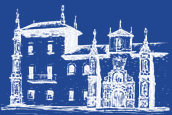Abstract
This paper provides a brief chronological overview of Basque immigration and participation in the sheep industry of the American West. It describes the process leading to the conception and development of the National Basque Sheepherder Monument in Reno’s Rancho San Rafael Park, including the discussions with regards to whether it should be Traditional/Realistic or Modern/Symbolic in nature. It explains the potential crisis that threatened to sidetrack the Monument, the inaugural ceremony and the symbolism of the statue Bakardade/Solitude by Basque sculptor Nestor Basterretxea and its relationship with the characteristics of the Basque people. Finally, it incorporates the figurative sculpture donated by the John Ascuaga family to the University of Nevada, Reno.
DOI
https://doi.org/10.18122/boga.10.1.4.boisestate
Recommended Citation
Urza, Carmelo and Douglass, William A.
(2023)
"Managing Monumental Crises: The Bakardade (Solitude) National Basque Monument,"
BOGA: Basque Studies Consortium Journal: Vol. 10
:
Iss.
1
, Article 4.
https://doi.org/10.18122/boga.10.1.4.boisestate
Available at:
https://scholarworks.boisestate.edu/boga/vol10/iss1/4


About the Author
Carmelo Urza was born in the Basque Country near Bilbao immigrating, with his mother Maria Luisa Larrauri Goicoechea and brother Enrique, to the U.S. in 1953. They spent the next 11 years at the Nicholson Sheep Ranch, managed by his father Anastasio, off the Snake River while attending Melba Schools. Urza founded the University Studies Abroad Consortium (USAC). He remained the CEO and President of USAC until his retirement in 2017. He was a member of the organizing committee of the National Monument of the Basque Sheepherder of Reno, Nevada. He wrote a book about the National Basque Monument titled: Solitude: Art and Symbolism in the National Basque Monument (1993). He also wrote a book about Basque handball in America: Historia de la Pelota Vasca en las Américas (1994). In 1995, the local government of Donostia awarded him with the Golden Drum.
Education
William Anthony Douglass, between 1963 and 1965 conducted field research in the villages of Etxalar, Navarra and Aulesti, Bizkaia on the causes and consequences of emigration for his doctoral dissertation. In 1967, he was contracted to create a Basque Studies Program for the Desert Research Institute. He directed it for the next 33 years until his retirement at the end of 1999. He has authored more than two dozen books and 200 articles, the majority of which deal with Basque topics. Douglass is a Reno native and the son of a pioneer Nevada gaming entrepreneur. Bill was himself part-owner of three Reno casinos and his most recent publication is a novel entitled The Starlight Hotel-Casino.
Education